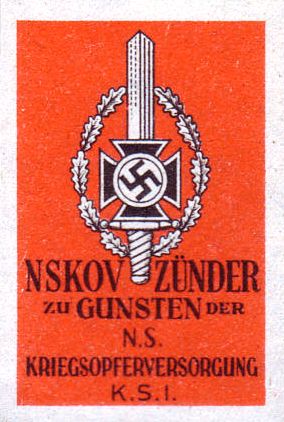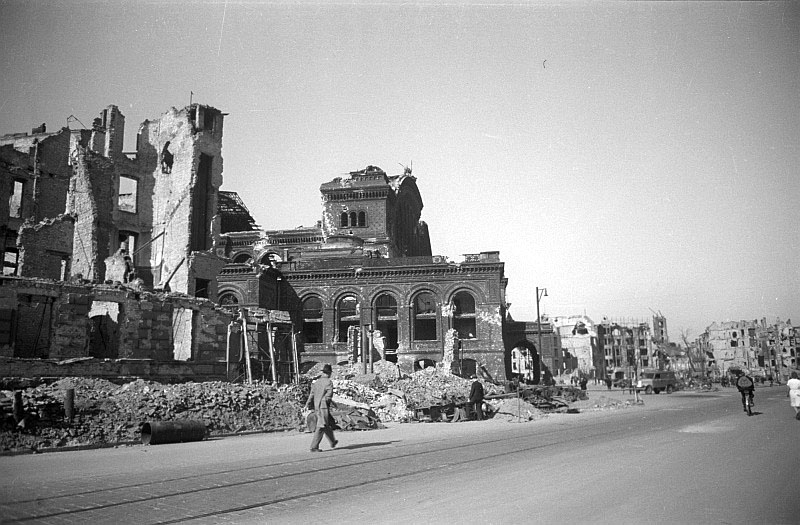|
NSKOV
The National Socialist War Victim's Care (, NSKOV) was a social welfare organization for seriously wounded veterans as well as frontline fighters of World War I. The NSKOV was established in 1934 and was affiliated to the Nazi Party. (in German). After 's defeat in World War II, the American military government ... [...More Info...] [...Related Items...] OR: [Wikipedia] [Google] [Baidu] |
Nazi Party
The Nazi Party, officially the National Socialist German Workers' Party ( or NSDAP), was a far-right politics, far-right political party in Germany active between 1920 and 1945 that created and supported the ideology of Nazism. Its precursor, the German Workers' Party (; DAP), existed from 1919 to 1920. The Nazi Party emerged from the Extremism, extremist German nationalism, German nationalist ("Völkisch nationalism, ''Völkisch'' nationalist"), racism, racist, and populism, populist paramilitary culture, which fought against communism, communist uprisings in post–World War I Germany. The party was created to draw workers away from communism and into nationalism. Initially, Nazi political strategy focused on anti-big business, anti-bourgeoisie, and anti-capitalism, disingenuously using socialist rhetoric to gain the support of the lower middle class; it was later downplayed to gain the support of business leaders. By the 1930s, the party's main focus shifted to Antisemit ... [...More Info...] [...Related Items...] OR: [Wikipedia] [Google] [Baidu] |
Berlin
Berlin ( ; ) is the Capital of Germany, capital and largest city of Germany, by both area and List of cities in Germany by population, population. With 3.7 million inhabitants, it has the List of cities in the European Union by population within city limits, highest population within its city limits of any city in the European Union. The city is also one of the states of Germany, being the List of German states by area, third smallest state in the country by area. Berlin is surrounded by the state of Brandenburg, and Brandenburg's capital Potsdam is nearby. The urban area of Berlin has a population of over 4.6 million and is therefore the most populous urban area in Germany. The Berlin/Brandenburg Metropolitan Region, Berlin-Brandenburg capital region has around 6.2 million inhabitants and is Germany's second-largest metropolitan region after the Rhine-Ruhr region, as well as the List of EU metropolitan areas by GDP, fifth-biggest metropolitan region by GDP in the European Union. ... [...More Info...] [...Related Items...] OR: [Wikipedia] [Google] [Baidu] |
Organizations Established In 1934
An organization or organisation (English in the Commonwealth of Nations, Commonwealth English; American and British English spelling differences#-ise, -ize (-isation, -ization), see spelling differences) is an legal entity, entity—such as a company, or corporation or an institution (formal organization), or an Voluntary association, association—comprising one or more person, people and having a particular purpose. Organizations may also operate secretly or illegally in the case of secret society , secret societies, criminal organizations, and resistance movements. And in some cases may have obstacles from other organizations (e.g.: Southern Christian Leadership Conference, MLK's organization). What makes an organization recognized by the government is either filling out Incorporation (business), incorporation or recognition in the form of either societal pressure (e.g.: Advocacy group), causing concerns (e.g.: Resistance movement) or being considered the spokesperson o ... [...More Info...] [...Related Items...] OR: [Wikipedia] [Google] [Baidu] |
Nazi Party Organizations
Nazism (), formally named National Socialism (NS; , ), is the far-right politics, far-right Totalitarianism, totalitarian socio-political ideology and practices associated with Adolf Hitler and the Nazi Party (NSDAP) in Germany. During Hitler's rise to power, it was frequently referred to as Hitler Fascism () and Hitlerism (). The term "neo-Nazism" is applied to other far-right groups with similar ideology, which formed after World War II, and after Nazi Germany collapsed. Nazism is a form of fascism, with disdain for liberal democracy and the parliamentary system. Its beliefs include support for dictatorship, fervent antisemitism, anti-communism, anti-Slavism, anti-Romani sentiment, scientific racism, white supremacy, Nordicism, social Darwinism, homophobia, ableism, and the use of eugenics. The ultranationalism of the Nazis originated in pan-Germanism and the ethno-nationalist ''Völkisch movement, Völkisch'' movement which had been a prominent aspect of German nationa ... [...More Info...] [...Related Items...] OR: [Wikipedia] [Google] [Baidu] |
1945 Disestablishments In Germany
1945 marked the end of World War II, the fall of Nazi Germany, and the Empire of Japan. It is also the year concentration camps were liberated and the only year in which atomic weapons have been used in combat. Events World War II will be abbreviated as “WWII” January * January 1 – WWII: ** Germany begins Operation Bodenplatte, an attempt by the ''Luftwaffe'' to cripple Allied air forces in the Low Countries. ** Chenogne massacre: German prisoners are allegedly killed by American forces near the village of Chenogne, Belgium. * January 6 – WWII: A German offensive recaptures Esztergom, Hungary from the Soviets. * January 9 – WWII: American and Australian troops land at Lingayen Gulf on western coast of the largest Philippine island of Luzon, occupied by Japan since 1942. * January 12 – WWII: The Soviet Union begins the Vistula–Oder Offensive in Eastern Europe, against the German Army. * January 13 – WWII: The Soviet Union begins the East Prussian Offen ... [...More Info...] [...Related Items...] OR: [Wikipedia] [Google] [Baidu] |
1934 Establishments In Germany
Events January–February * January 1 – The International Telecommunication Union, a specialist agency of the League of Nations, is established. * January 15 – The 8.0 1934 Nepal–Bihar earthquake, Nepal–Bihar earthquake strikes Nepal and Bihar with a maximum Mercalli intensity scale, Mercalli intensity of XI (''Extreme''), killing an estimated 6,000–10,700 people. * February 6 – 6 February 1934 crisis, French political crisis: The French far-right leagues rally in front of the Palais Bourbon, in an attempted coup d'état against the French Third Republic, Third Republic. * February 9 ** Gaston Doumergue forms a new government in France. ** Second Hellenic Republic, Greece, Kingdom of Romania, Romania, Turkey and Kingdom of Yugoslavia, Yugoslavia form the Balkan Pact. * February 12–February 15, 15 – Austrian Civil War: The Fatherland Front (Austria), Fatherland Front consolidates its power in a series of clashes across the country. * February 16 – The ... [...More Info...] [...Related Items...] OR: [Wikipedia] [Google] [Baidu] |
Social Welfare Charities
Social organisms, including human(s), live collectively in interacting populations. This interaction is considered social whether they are aware of it or not, and whether the exchange is voluntary or not. Etymology The word "social" derives from the Latin word ''socii'' ("allies"). It is particularly derived from the Italian ''Socii'' states, historical allies of the Roman Republic (although they rebelled against Rome in the Social War of 91–87 BC). Social theorists In the view of Karl Marx,Morrison, Ken. ''Marx, Durkheim, Weber. Formations of modern social thought'' human beings are intrinsically, necessarily and by definition social beings who, beyond being "gregarious creatures", cannot survive and meet their needs other than through social co-operation and association. Their social characteristics are therefore to a large extent an objectively given fact, stamped on them from birth and affirmed by socialization processes; and, according to Marx, in producing and reproduci ... [...More Info...] [...Related Items...] OR: [Wikipedia] [Google] [Baidu] |
Aftermath Of World War I In Germany
Aftermath may refer to: Companies * Aftermath (comics), an imprint of Devil's Due Publishing * Aftermath Entertainment, an American record label founded by Dr. Dre * Aftermath Media, an American multimedia company * Aftermath Services, an American crime-scene cleanup company * ''Aftermath'' (website), a video game website and blog founded in 2023 Film and television Films * ''Aftermath'' (1914 film), an American lost silent film * ''Aftermath'' (1927 film), a German silent film * ''Aftermath'' (1990 film) or ''Crash: The Mystery of Flight 1501'', an American television film * ''Aftermath'' (1994 film), a Spanish short horror film by Nacho Cerdà * ''Aftermath'' (2001 film), a television movie starring Meredith Baxter * ''Aftermath'' (2002 film), a film starring Sean Young * ''Aftermath'' (2004 film), a Danish film * ''Aftermath'' (2012 film), a Polish thriller and drama * ''Aftermath'' (2013 film), a film starring Anthony Michael Hall * ''Aftermath'' (2014 film), an a ... [...More Info...] [...Related Items...] OR: [Wikipedia] [Google] [Baidu] |
German Veterans' Organisations
German(s) may refer to: * Germany, the country of the Germans and German things **Germania (Roman era) * Germans, citizens of Germany, people of German ancestry, or native speakers of the German language ** For citizenship in Germany, see also German nationality law **Germanic peoples (Roman era) * German diaspora * German language * German cuisine, traditional foods of Germany People * German (given name) * German (surname) * Germán, a Spanish name Places * German (parish), Isle of Man * German, Albania, or Gërmej * German, Bulgaria * German, Iran * German, North Macedonia * German, New York, U.S. * Agios Germanos, Greece Other uses * German (mythology), a South Slavic mythological being * Germans (band), a Canadian rock band * "German" (song), a 2019 song by No Money Enterprise * ''The German'', a 2008 short film * "The Germans", an episode of ''Fawlty Towers'' * ''The German'', a nickname for Congolese rebel André Kisase Ngandu See also * Germanic (di ... [...More Info...] [...Related Items...] OR: [Wikipedia] [Google] [Baidu] |
Deutscher Kriegerbund
Deutscher Kriegerbund () was a war veterans' and reservists' association in Germany established in April 1873 in Weißenfels. Its origins lie in a Warrior Association established in 1786 by fusiliers of Frederick II of Prussia's army in Wangerin/Pomerania. The original purpose of the war veterans' associations was to provide their members and former soldiers with proper burial arrangements. Former soldiers felt the need of commemorative tombs that would preserve the dignity of their former comrades-in-arms and honor them even after their death. This type of association received a considerable boost after Prussia's victorious battles against the Danish (1864), Austrian (1866) and French armies in 1871. A number of these veterans' associations established the Deutscher Kriegerbund by joining efforts for a common cause in 1873. In April 1897, the Deutscher Kriegerbund became the Prussian Country's Warrior League (). Its former name Deutscher Kriegerbund was kept for certain econo ... [...More Info...] [...Related Items...] OR: [Wikipedia] [Google] [Baidu] |
Kreuzberg
Kreuzberg () is a district of Berlin, Germany. It is part of the Friedrichshain-Kreuzberg borough located south of Berlin-Mitte, Mitte. During the Cold War era, it was one of the poorest areas of West Berlin, but since German reunification in 1990, it has undergone significant gentrification and is now known for its vibrant arts scene. The borough is known for its large percentage of immigrants and descendants of immigrants, many of whom are of Turks in Germany, Turkish ancestry. This influx began in the 1960s and 1970s when West Germany invited 'Gastarbeiter' (guest workers) from various countries, including Turkey, Italy, Greece, and Yugoslavia, to address labour shortages and aid in Reconstruction of Germany, post-war reconstruction. As of 2006, 31.6% of Kreuzberg's inhabitants did not have German citizenship. Kreuzberg is known for its diverse cultural life and experimental alternative lifestyles, making it an attractive area for many. However, some parts of the district ar ... [...More Info...] [...Related Items...] OR: [Wikipedia] [Google] [Baidu] |





